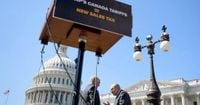In a significant political shift, four Republican senators joined their Democratic counterparts in the U.S. Senate on Wednesday, April 2, 2025, to pass a resolution aimed at terminating President Donald Trump’s justification for imposing tariffs on Canadian goods under the guise of a fentanyl emergency. This bipartisan effort, led by Democratic Senator Tim Kaine of Virginia, culminated in a narrow vote of 51-48, signaling a rare moment of unity in an increasingly polarized Senate.
Senators Mitch McConnell and Rand Paul of Kentucky, Lisa Murkowski of Alaska, and Susan Collins of Maine broke ranks with their party to support the resolution, which is largely seen as symbolic given the Republican majority in the House of Representatives. The resolution seeks to end Trump’s use of the International Economic Emergency Powers Act (IEEPA) to declare an emergency regarding fentanyl trafficking, a move that has allowed the administration to impose tariffs on Canada.
Trump’s announcement of a "reciprocal" tariff plan, which he termed “Liberation Day,” did not include Canada in the list of countries facing new tariffs. However, existing tariffs of 25 percent on Canadian goods, including steel and aluminum, remain in place, along with a 10 percent tariff on energy and potash products. The President’s tariffs have been justified by his administration as necessary to combat the flow of fentanyl, a potent synthetic opioid, into the United States.
Senator Kaine emphasized on the Senate floor that Canada is not a major source of fentanyl entering the U.S., pointing out that U.S. Customs and Border Protection seized just under 20 kilograms of fentanyl at the northern border during the 2024 fiscal year, compared to over 9,500 kilograms seized at the southern border. “No one in this chamber would dispute that fentanyl is a massive problem, and indeed an emergency,” he stated. “But calling it a Canadian emergency and putting the same tariffs on Canadian products as we put on Mexican products is an invented emergency, not a real emergency.”
In response to the resolution, Trump took to social media, urging the Republican senators to align with his administration, claiming that the Democrats were seeking to shield Canada from accountability regarding fentanyl trafficking. “The tariffs on Canada would be detrimental to many Maine families and our local economies,” Collins remarked, echoing concerns from various sectors that would be adversely affected by the tariffs.
As the political landscape shifted, Prime Minister Mark Carney of Canada vowed to retaliate against U.S. tariffs with “purpose and force.” He noted that the current U.S. tariffs will directly affect millions of Canadians and promised to outline Canada’s response after consulting with provincial and territorial premiers.
On the ground in Canada, political leaders are already strategizing their responses to the ongoing trade tensions. Conservative leader Pierre Poilievre criticized the tariffs as an “unfair attack” on the Canadian economy, particularly targeting the auto sector, which is significantly intertwined with U.S. manufacturing. He called for immediate, targeted retaliation and urged for the renegotiation of the Canada-United States-Mexico Agreement (CUSMA), due for review in 2026.
Meanwhile, New Democratic Party leader Jagmeet Singh proposed measures to support workers impacted by the tariffs, labeling Trump as an “arsonist” for his economic policies. Bloc Québécois leader Yves-François Blanchet suggested that any counter-tariffs should be “surgically chosen” to minimize damage to the Canadian economy.
Despite being spared from new tariffs, Canadian business leaders expressed concern over the existing tariffs and the uncertainty surrounding U.S. trade policies. Candace Laing, president of the Canadian Chamber of Commerce, stated that the announcement reflects a reality that Canadian businesses have been grappling with for months. “The chain reaction of tariffs and counter-tariffs will have a real and distressing economic impact on Americans, Canadians, and the global economy,” she said.
Looking ahead, the situation remains fluid. Carney warned that while Canada may have dodged the worst of the tariff announcements, the ongoing uncertainty continues to pose a significant threat to Canadian businesses. The Prime Minister has called for a cabinet meeting to discuss further actions, and the Canadian government is preparing to implement countermeasures against U.S. tariffs.
The U.S. Senate’s resolution to block the tariffs on Canadian goods, while unlikely to gain traction in the House, represents a notable challenge to Trump’s trade policy and reflects a growing concern among lawmakers about the economic fallout of protectionist measures. As the political and economic landscape evolves, both countries will need to navigate the complex dynamics of their trading relationship.
In conclusion, the recent developments underscore the delicate balance of trade relations between the U.S. and Canada. With tariffs still looming and political tensions high, the future of North American trade hangs in the balance, leaving many wondering how this will unfold in the coming months.






